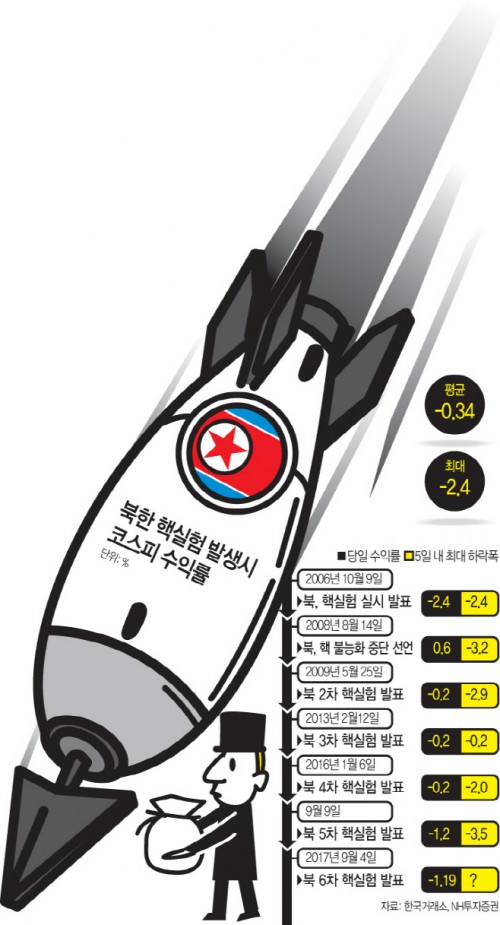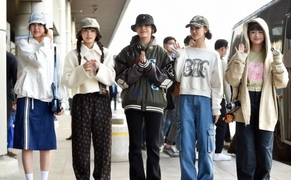 |
By AsiaToday reporter Jang Jin-won
The domestic stock market was shaken up by North Korea's 6th nuclear test on Sunday. The KOSPI (Korea Composite Stock Price Index) opened at about 40 points lower than the previous trading day and closed at 2,329.65, down 1.19% from Friday. The KOSDAQ was also hit hard by North Korean nuclear test, plunging 1.7%.
According to the Korea Exchange on Monday, KOSPI hit its lowest since North Korea's fifth nuclear test on Sept. 9, 2016, when KOSPI slid 1.25%. Foreign investors, who have been on a selling spree, showed strong buying trend just before the closing of the market, net buying 4.4 billion won ($3.9 million).
Many analysts point out that despite the nuclear test that caused the highest tension on Korean Peninsula as well as North America and Northeast Asia, foreign investors took quite a moderate stance due to learning effect. It seems that many believe that North Korea and the United States, who hold the key to solving the situation, are eventually forced to come to a diplomatic solution.
However, there are yet fears of capital withdrawals although foreign buyers showed no signs of selling on Monday. If foreign investors, who mainly contributed to breaking the KOSPI's 2,450 level this year, go for "sell Korea" by taking advantage of geopolitical risks, the bullish stock market could stop and the 2,300 level may collapse.
Foreigners purchased 76.3 billion won at the KOSPI market last Friday (Sept. 1) and sold around 500 billion won ($441.9 million) of domestic stocks last week. Foreign investment, which seemed to level off for a while due to North Korean threat on Aug. 28, was converted to net selling of 263.1 billion won ($232.5 million) on one single day on Aug. 29 as tensions rose to the highest level with North Korea's missile launch over Japan on Aug. 29.
The bigger problem is whether this "selling" trend will continue. Looking at North Korea's nuclear test since 2006 and the KOSPI index, KOSPI experienced the biggest drop of 2.4% in 2006 when North Korea carried out its first nuclear test. Except North Korea's fifth nuclear test in 2016 when KOSPI fell 1.2%, KOSPI index fell nearly 0.2% on the day of North Korea's nuclear test.
However, the impact of the 5th and 6th nuclear tests on the stock market is quite different from the previous ones. The stock market fell sharply by 1.2% on the days of nuclear test in 2016 and 2017. The earnings rate fell 3.5% for five business days after the fifth nuclear test in September 2016, proving that the capital market became more variable as the North Korean nuclear test advanced more. Kim Byung-yeon, analyst with NH Investment & Securities, said, "It took an average of 10 business days to recover the share price before the nuclear test. Looking at the past, KOSPI may fall to 2,200 level at worst."
On the other hand, institutional investors who are aggressively buying are gaining attention as they say that crises could turn into opportunities. As the Korean stock market is still strong and its fundamentals are solid, they see that this is the right time to buy.
The buying of institutional investors was prominent on Sept. 4, the first day after the nuclear test. Institutions net bought 316.7 billion won ($279.9 million) in the KOSPI market on the same day. Many securities firms also say that this is the right time to buy. Yoon Kyung-eun, president at KB Securities, said on Sunday, "The domestic stock market is still strong. These days, which has entered into a correction phase due to geopolitical risks, is the time to buy stocks."
Many industry observers say that geopolitical risks are predictable variables. An official of Samsung Securities said on Monday, "North Korea's additional military provocations such as nuclear test are expected. Since it was a foreseeable variable, the sensitivity of the financial market to geopolitical risks seem to be lower than that of August."
Many industry observers say that geopolitical risks are predictable variables. An official of Samsung Securities said on Monday, "North Korea's additional military provocations such as nuclear test are expected. Since it was a foreseeable variable, the sensitivity of the financial market to geopolitical risks seem to be lower than that of August."
#KOSPI #KOSDAQ #stock market #North Korea #nuclear test
Copyright by Asiatoday
Most Read
-
1
-
2
-
3
-
4
-
5
-
6
-
7





















